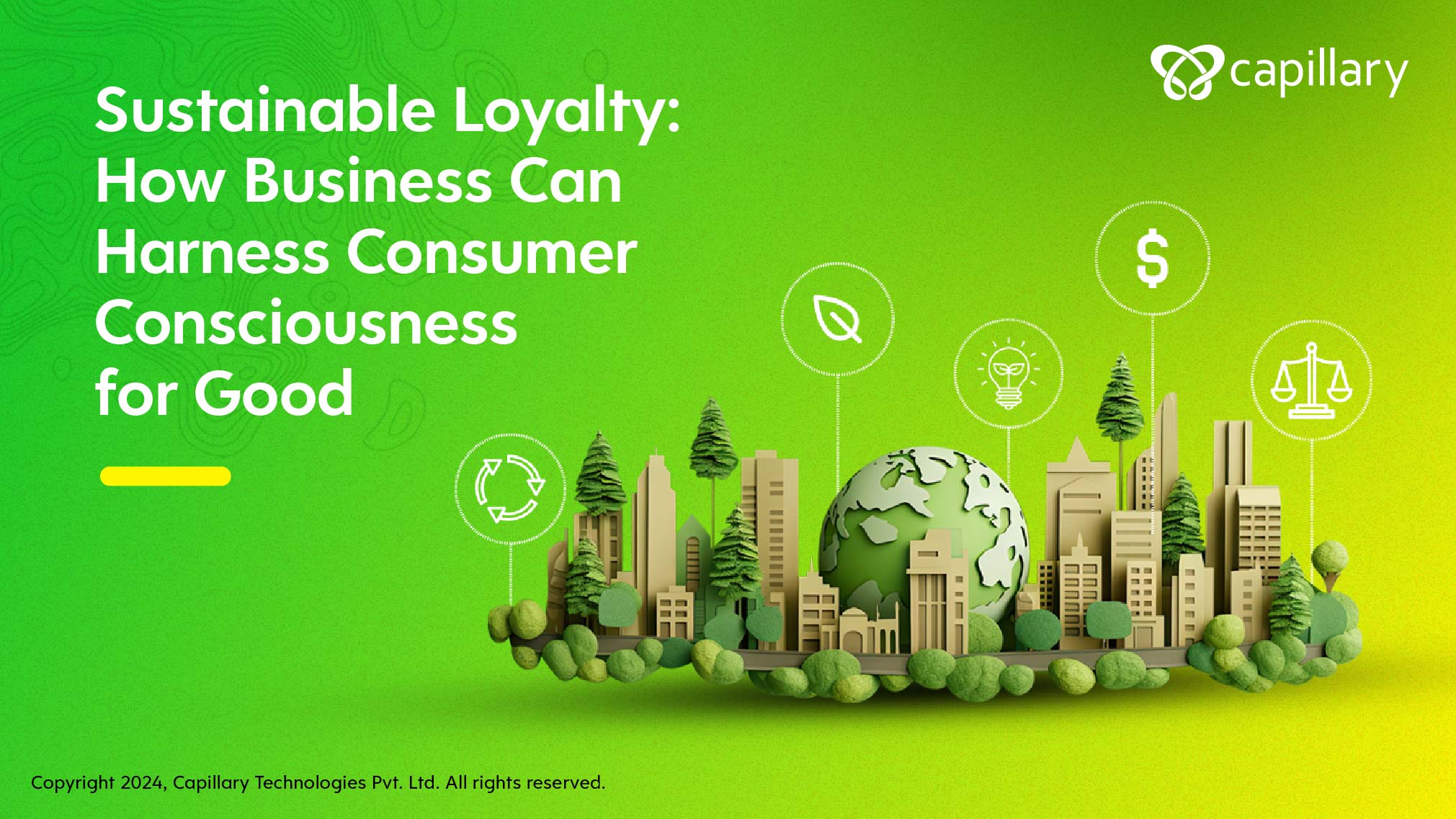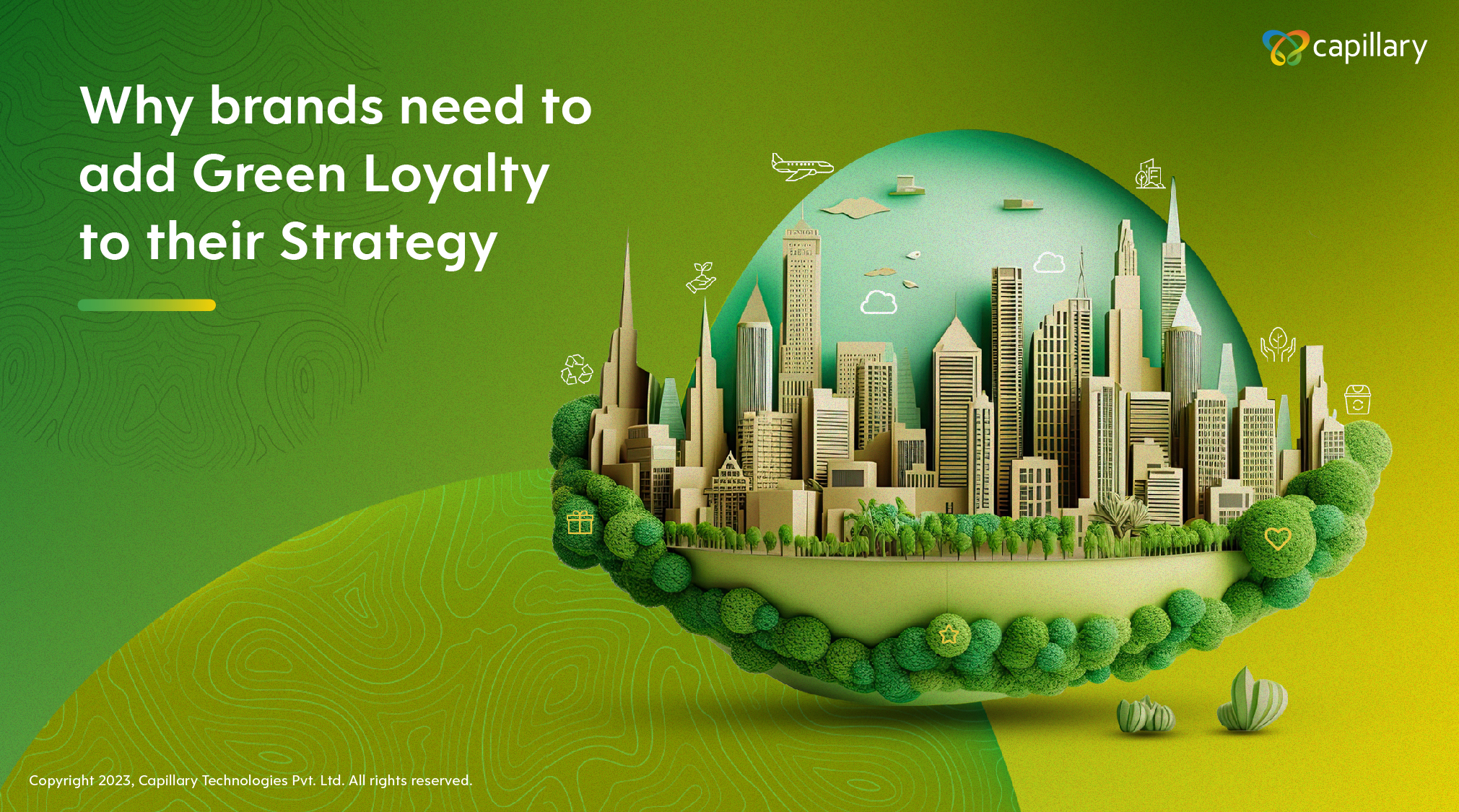- Design industry shaping loyalty programs
- Integrate easily and go live quicker
- Deliver hyper-personalized consumer experiences
Blue Rewards from Al Futtaim Group Shares Loyalty Success Stories and Evolution. Watch Podcast >
Capillary Announces 2nd Annual Captivate 2025 Summit: Transforming Loyalty Management with New AI Tech Read more >

In an era marked by climate change and heightened environmental awareness, consumers are more concerned than ever about the impact of their choices. A staggering 86% of consumers now prefer sustainable and equitable products, and they deeply care about a brand’s values. 73% of GenZ alone are willing to pay for sustainable products. This growing consumer consciousness presents a unique opportunity for businesses.
And that opportunity is to add sustainability to your loyalty program. Loyalty programs could play a crucial role in aligning with these consumer preferences. By integrating sustainability into your loyalty marketing, businesses can not only create a positive environmental impact but also drive business growth and success. Here are some ways industries can embrace sustainability through their loyalty programs.
Airlines can play a significant role in promoting sustainable travel. By offering bonus points or tier status upgrades to members who opt for eco-friendly travel options, such as direct flights or lower-emission routes, airlines can incentivize greener choices. This not only helps reduce the carbon footprint but also strengthens customer loyalty by aligning with passengers’ growing environmental concerns.
Allowing members to donate their loyalty points to environmental causes is another impactful strategy. This not only supports important environmental initiatives but also enhances the airline’s brand image as a socially responsible entity.
Airlines can partner with eco-friendly brands and organizations to offer exclusive benefits or discounts to their loyalty program members. This creates a network of sustainable choices for consumers, further encouraging environmentally conscious behaviors.
Retailers can leverage data analytics to provide personalized suggestions for sustainable products. By highlighting eco-friendly alternatives, they can guide customers towards making more sustainable choices without compromising on style or quality.
Offering priority access to eco-friendly product launches can also drive loyalty. Customers who are passionate about sustainability will appreciate being the first to know about and purchase new sustainable products.
Rewarding customers for recycling old clothes or using eco-friendly bags can significantly promote sustainable practices. These incentives not only reduce waste but also reinforce the brand’s commitment to sustainability.
The fashion industry alone was responsible for 4% of greenhouse gas emissions in 2018. Imagine the shift sustainable initiatives can bring in pulling this number down.
Consumer packaged goods (CPG) companies can encourage recycling and repurposing of product packaging by offering incentives. For instance, customers could earn points for returning used packaging, which can then be recycled or repurposed by the company.
Being recognized by eco-labels and earning sustainable certifications like Fair Trade, Organic, or Rainforest Alliance, etc. can boost a company’s credibility and appeal to environmentally-conscious consumers. Highlighting these achievements within loyalty programs can further enhance customer engagement and loyalty.
Providing resources and tips for sustainable practices related to their products can also engage customers. For example, sharing ideas for repurposing containers or conserving product use aligns the brand with a sustainable lifestyle.
Food chains and quick-service restaurants (QSRs) can offer eco-friendly delivery options to reduce fuel emissions. For instance, using electric vehicles or bicycle couriers for deliveries can appeal to eco-conscious customers.
Collaborating with local community gardens to source fresh produce not only supports local agriculture but also reduces the carbon footprint associated with long-distance transportation. This can be an attractive feature for customers who prioritize sustainability. Chipotle Mexican Grill, a fine dining restaurant has pledged to locally source their produce to champion sustainable causes.
Offering discounts or bonus points for ordering smaller portion sizes can help reduce food waste. This strategy not only promotes mindful eating but also resonates with customers who are concerned about the environmental impact of food waste.
Loyalty programs have the potential to play a crucial role in fostering a greener future while driving sustainable business growth. By incorporating environmentally friendly practices and incentives into loyalty programs, companies can strengthen customer engagement, enhance brand loyalty, and contribute to a sustainable future.
Research indicates that fully engaged customers represent a 23% premium in terms of share of wallet, profitability, revenue, and relationship growth compared to the average customer. Moreover, 66% of consumers globally are willing to pay extra for goods and services from businesses committed to sustainability. Therefore, integrating sustainability into loyalty programs is not just a trend but a strategic imperative.

January 24, 2025 | 4 Min Read
Discover how green loyalty programs can boost customer engag

June 5, 2024 | 4 Min Read
This World Environment Day, let's explore how loyalty progra

January 29, 2025 | 4 Min Read